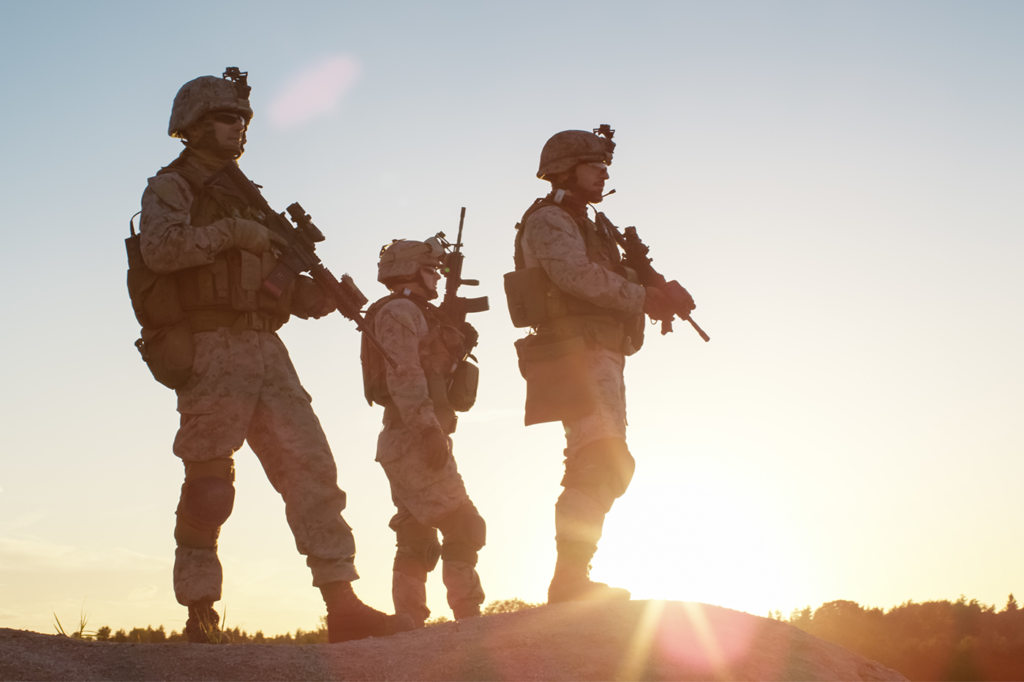Daryl Charles and Mark David Hall have laid out, in the opening chapter of America and the Just War Tradition: A History of U.S. Conflicts, about as clear and succinct a definition of that tradition as is anywhere on offer. This is no mean achievement, since the literature on the just war tradition is both long and ancient. Even in modern times, the subject of just war has been the feature of impressive and weighty studies, beginning in 1919 with Alfred Vanderpol’s The Scholastic Doctrine of the Right of War, and running through a series of magisterial works: Robert Regout’s neo-Augustinian La doctrine de la guerre juste de Saint Augustin à nos jours (1935), Bruno de Solages’ Théologie de la guerre juste (1935), and Roland Bainton’s Christian Attitudes Toward War and Peace: A Historical Survey (1961). This is a literature that has undergone exponential growth since the publication of Paul Ramsey’s War and the Christian Conscience (1961) and Michael Walzer’s Just and Unjust Wars (1977), and Hall and Charles’ bibliographical footnote covering the last fifteen years lists a groan-worthy forty-nine book titles (with no reckoning attempted of journal and periodical articles).
The first question this poses for me is: has any of this mattered? I am the son of a professional soldier, and the father of another; I have written at length about war, and one American war in particular, and have lived all of my life in a country that has been imbrued in war for almost every year I have been conscious. And so I come to the tradition of just war thinking to ask whether this thinking—Augustinian, Thomistic, pacifistic, and so on—has made any measurable difference in shaping the conduct of war, especially when compared to the influence on war made by technology and civilizational conflict. Or is the language of just war a way of excusing the inevitable complicity of citizens and subjects in the wars to which their nation-states commit them? In other words, what purpose does the just war tradition actually serve?
It is worth remembering that the major works that touch on just war have tended to come after wars where the behavior of combatants spilled over into atrocity, terror, and reprisal on scales that could not be discounted as mere incidents. Grotius was writing in an attempt to find just cause for the Dutch rebellion against Spain; Pufendorf and Vattel were writing in the wake of the Thirty Years’ War and Europe’s religious civil wars; Vanderpol, Regout, and de Solages are at work after World War One; Ramsey’s and Walzer’s works are codas to World War Two and Vietnam.
No similar volume of writing on just war appears after the American Revolution, the War of 1812, or the Mexican War, because these conflicts are comparatively small in scale (and for the latter two, in duration as well), and the protests that are lodged against them are predicated (as in the case of Abraham Lincoln’s condemnation of the Mexican War) on constitutional or legal grounds rather than moral ones. Only when wars balloon in scope does just war theorizing seem to come into play, and even then it can often appear more as a post facto rationalization of a belligerent’s behavior.
Start your day with Public Discourse
Sign up and get our daily essays sent straight to your inbox.Francis Lieber’s wartime code of behavior, which he devised at the behest of General-in-Chief Henry Wager Halleck during the Civil War, is unusual for being fashioned in the midst of a conflict, but most of its provisions are carefully tailored to grant passes to federal misconduct. In the other major cases, from Grotius to Walzer, the inquiry has come after the outrages. While this may be explained as an effort to prevent the repetition of certain abominations, it also comes too late to have helped the situations it tries to analyze, and often offers solutions that have little or no application to the changed contexts of future conflicts. So then, what exactly does the just war tradition accomplish?
The problem of timing—quoque paulo, nimium sero (too little, too late)—is accompanied by another problem, and that is the old Russian demand, kto vinovat (who is to blame)? It is customary (to the point of inevitability) to focus inquiries about just war on the deciders in jus ad bellum, the decision to go to war. But who exactly are a war’s deciders? Do they lead or are they led? In 1914, the deciders—Wilhelm II, Nicholas II, Raymond Poincaré, Herbert Henry Asquith—all seem remarkable chiefly for how little they decided anything. In fact, Wilhelm and Nicholas seem to have understood, each in his own defective and stumbling way, that they were signing Europe’s death warrant and bleated feebly about their desire to avoid it. But they were overruled by the moral obligations (about treaties and ethnic solidarity) that we later observers judge to have been absent in 1914.
Indeed in most wars, leaders adopt a variety of poses as justifications for actions that they, in truth, believe have been thrust upon them (as with Lyndon Johnson in Vietnam or Abraham Lincoln in the Civil War). But if this is so, then to whom does blame for war actually belong? Entire nations or races? Previous generations of treaty-makers? Into what crack in this façade, or into whose hands, do we wedge the question of justice in war? War has the complexity of most of the human condition—so complex, indeed, that it often behaves like a force of nature, but with a human face. And that renders the question of determining the justice of a war a little like determining the justice of a tornado.
The second question that the just war tradition poses to me as a professional historian is whether war is a phenomenon whose character can be decided as either just or unjust. Charles and Hall have been at pains to insist, through the words of James Turner Johnson, that “the standard here is not moral perfection.” Nevertheless, just war has tended to be a question that, for a popular audience, usually admits of only one of two answers: yes or no. Maybe, in the case of just war, is about as good as no.
This is the difficulty that most of the contributors to Hall and Charles’s volume find themselves unable to avoid. We read, on the American Revolution, that “the Continental Army had arguably fought an unjust war in a just manner to secure an unjust peace.” What we hear are not the qualifications arguably and manner, but simply unjust. Again: “The United States waged a just war against Germany, Japan, and Italy,” including the use of atomic weapons. What we listen for is the single word just, for of what use is a determination that a war was mostly just? Like the audience in the courtroom, and even the judge on the bench, what we lean forward to catch from the jury is guilty or not guilty, not the extenuations or explanations that the foreman wants to add.
But a moment’s reflection forces us to realize that what we have done in such a case is talk about war as though it were a singular phenomenon, which could be given a thumbs-up or thumbs-down, rather than the complicated miasma into which it usually develops. Something like a scorecard that rewards and acknowledges the variety of acts and actions would be more realistic, so that we could talk about just actions or just actors in war. But even this runs the risk of distance. Historians, and moralists who dabble in historical problems, have the advantage of seeing matters from a distance, and often an Olympian distance if they are energetic enough to do seriously deep research. But that very distancing removes the historian from an event—war—in which involvement is the very essence of decision.
Historians, and moralists who dabble in historical problems, have the advantage of seeing matters from a distance, and often an Olympian distance if they are energetic enough to do seriously deep research. But that very distancing removes the historian from an event—war—in which involvement is the very essence of decision.
Historical distance prevents us from entering into the passionate mindsets that commit nations to war and sustain them in it, with the result that those mindsets can later be loftily written off as mistaken. Yet, at the moment, those mindsets may have been as morally compelling as any other. We are told, for instance, that “the Great War challenges the faith many Americans maintain in our collective ability to know the world and shape it in our image.” Yes, it does, but only if one is not boiling with anger over the corpses floating over the grave of the Lusitania, over the execution of Edith Cavell, or over the introduction of chlorine gas as a weapon. The passage of years may reveal that anger to have been poorly constructed; but at the moment decisions were being made, how can that anger be said to be unjust?
War invites a plague of abstractions, so perhaps we do our best when we consider the question of a just war as close to the individual level as possible. When we do, we will also learn that there is nothing good or pleasant about the experience of war.
War invites a plague of abstractions, so perhaps we do our best when we consider the question of a just war as close to the individual level as possible. When we do, we will also learn that there is nothing good or pleasant about the experience of war. It forces people into incessant uncertainty and mistrust: Do I take this one prisoner or shoot him because he might have a concealed trench knife? Do I trust this intelligence or denounce the source as an enemy luring us into a trap? Is it safe to walk down this street or through this village, or should they be burned to flush out snipers? At the same time, it is undeniable that war also fascinates. It can even glorify and bring out noble qualities, and test qualities of organization and leadership. Indeed, if Dwight Eisenhower and Ulysses Grant are any example, it is precisely those who have best understood war who turn out to be the leaders most committed to peace.
When I consider the issues that Daryl Charles and David Hall have so ably presented, my instincts incline me to sympathy with Benjamin Franklin’s dictum that “there never was a good war, or a bad peace.” But I have learned to mistrust instincts untutored by reason, for there have been wars that contained some good, and some peaces that have engendered unmitigated evil. I have learned from Psalm 149 that “the praise of God” may indeed be in his people’s “mouths,”
and a double-edged sword in their hands,
to inflict vengeance on the nations
and punishment on the peoples,
to bind their kings with fetters,
their nobles with shackles of iron,
to carry out the sentence written against them—
this is the glory of all his faithful people.
And I have learned to respect the wisdom of William Saroyan, to look not so much for a just war, but for just men. “No man’s guilt is not yours, nor is any man’s innocence a thing apart,” Saroyan wrote. “Have no shame in being kindly and gentle, but if the time comes in the time of your life to kill, kill and have no regret.” In that way, “you shall not add to the misery and sorrow of the world, but shall smile to the infinite delight and mystery of it.”













